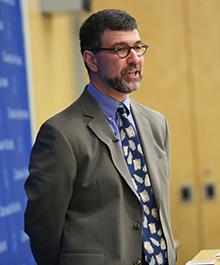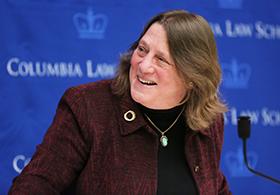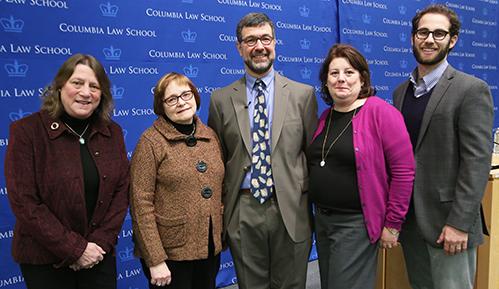Rethinking Copyright Renewal
IP Law Expert R. Anthony Reese Explores Creating "Optional Copyright Renewal" at the 28th Annual Horace S. Manges Lecture
New York, March 9, 2015—International obligations and the immense complexity of making the law applicable to widely varying factual circumstances make the creation of new copyright laws exceedingly challenging, said intellectual property authority R. Anthony Reese in the 28th annual Horace S. Manges Lecture hosted by Columbia Law School’s Kernochan Center for Law, Media and the Arts on Feb. 23. Reese is the Chancellor’s Professor of Law at the University of California – Irvine School of Law.
| R. Anthony Reese |
Following an introduction from Jane C. Ginsburg, the Morton L. Janklow Professor of Literary and Artistic Property Law and faculty director of the Kernochan Center, Reese discussed the question of whether to create an optional copyright renewal system to cause more works of little value to enter the public domain sooner than they otherwise would. Acknowledging that a mandatory system would likely run afoul of U.S. obligations under international copyright and trade treaties, he suggested that an optional system could pass muster, but would work only if authors were induced to opt for renewal. One such inducement might be a renewal term free from any obligations to first term grantees.
Reese used optional copyright renewal to demonstrate the array of thorny questions that any new copyright statute would confront. In the case of optional renewal, these issues would include when the work would have to be renewed, whether renewal would be required only once, who would be able to renew (e.g. who would be deemed the author’s heirs for this purpose), what would happen upon renewal, and how joint works would be handled.
| Professor Jane C. Ginsburg |
“I do not mean to suggest that we should not think big and bold, but my goal tonight is to identify some of the challenges,” Reese concluded. “The effort to create the Next Great Copyright Act will be hard, but it will be worth it.”
The Kernochan Center’s Horace S. Manges Lecture was established in 1986 by Weil, Gotshal & Manges in memory of the firm’s late partner Horace S. Manges, who spent his career as a trial lawyer and counsel to leading writers and publishers and the Association of American Publishers. Later in life, he helped found the Copyright Society of the U.S.A. The lecture is given each year by a lawyer who is influential in the field of intellectual property.
| Reese with members of the Kernochan Center team, including (l-r) Professor Jane C. Ginsburg, Executive Director June Besek, Deputy Director Philippa Loengard, and IP Fellow Brad A. Greenberg |


